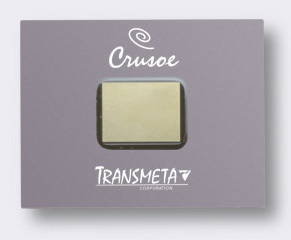Transmeta introduces Crusoe
TM3120
According to Transmeta the first two Crusoe models, the TM3120 and TM5400, were designed for minimal space and power consumption. By eliminating roughly 75 % of the logic transistors that would be required for an all-hardware design of similar performance, it was also possible to reduce the die size of the chip and thus the power dissipation. The difference is quite substantial: at comparable clock frequencies without active cooling a Pentium III sizzles at 105 C (221 F) when playing a DVD, the TM5400 only reaches 48 C (118 F). Another feature of the TM5400 is a power-saving technology called LongRun: it allows the TM5400 to adjust its power consumption without turning itself off but by adjusting its clock frequency on the fly.
Targeted at Web pads and mobile clients the TM3120 features 96 kB of L1 cache, a die size of 77 mm² and runs Mobile Linux in ROM. It is immediately available costing $65 for the 333 MHz and $89 for the 400 MHz version. The TM5400 is sampling and is supposed to be shipping by mid 2000. It comes with 128 kB L1 cache, 256 kB L2 cache, runs Microsoft Windows and NT, is aimed at ultra-light mobile PCs and costs $119 for the 500 MHz and $329 for the 700 MHz version. The die size is 73 mm². Both processors have an integrated Northbridge. As a fabless semiconductor company Transmeta needed a manufacturing partner: IBM produces the chips in 0.22 and possibly 0.18 micron technology, respectively. Transmeta has no plans to license the core or to open source the Code Morphing software. The company is selling to OEMs and system manufacturers directly.
Get Tom's Hardware's best news and in-depth reviews, straight to your inbox.
